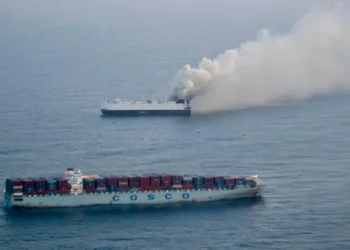JAKARTA: Indonesian navy divers scouring the sea bed were closing in on data recorders from a Sriwijaya Air jet that plunged into the sea two days ago with 62 people on board minutes after takeoff from Jakarta’s main airport.
The Boeing 737-500 jet was headed on a domestic flight to Pontianak on Borneo island, about 740 km from Jakarta, before it disappeared from radar screens four minutes after take-off and crashed into the Java sea. Flight SJ 182 had 12 crew and 50 passengers on board, all Indonesians and including 10 children.
The incident is the first major air crash in Indonesia since 189 passengers and crew were killed in 2018 when a Lion Air Boeing 737 MAX in 2018 also plunged into the Java Sea soon after taking off from Soekarno-Hatta International Airport.
Divers had further narrowed down the search area strongly suspected to be the location of the black boxes, a Navy spokesman told a news agency. With little prospect now of finding survivors, authorities also said that there would be a focus on recovering the bodies of victims.
A rescue diver said more human remains had been found on Monday and that underwater visibility was some 5-6 metres. A police hospital receiving the remains had taken 40 DNA samples from the relatives of victims and other medical records to help with identification, officials said.
An investigator at Indonesia’s National Transportation Safety Committee (KNKT) Nurcahyo Utomo told local media said the jet may have been intact before it hit the water, given the debris appeared to have scattered in a relatively tight area underwater.
Rescuers have so far found one of the jet’s turbines, pieces of the plane’s tail, the rim of a wheel and an emergency chute, as well as clothing and personal belongings from passengers.
The KNKT has previously said the US National Transportation Safety Board and Boeing would be involved in the investigation. In a statement at the weekend, Boeing said: “We are in contact with our airline customer and stand ready to support them during this difficult time.”
Tracking service Flightradar24 said the aircraft took off at 2:36 p.m. local time and climbed to 10,900 feet within four minutes. It then began a steep descent and stopped transmitting data 21 seconds later.
The Sriwijaya Air plane was nearly 27 years old, much older than Boeing’s problem-plagued 737 MAX model. Older 737 models are widely flown and do not have the stall-prevention system implicated in the MAX safety crisis.
With few immediate clues on what caused a catastrophic loss of control after take-off, investigators will rely heavily on retrieving flight recorders intact from the seabed. They will also study maintenance and engine records, pilot rosters and training, air traffic recordings and other data.
The crash comes at a sensitive time and place for Boeing after poor software contributed to crashes of the newer 737 MAX in Indonesia and Ethiopia. The long service history of the model involved in Saturday’s crash and its lack of similar software, mean design is seen less likely to be a key factor.


































